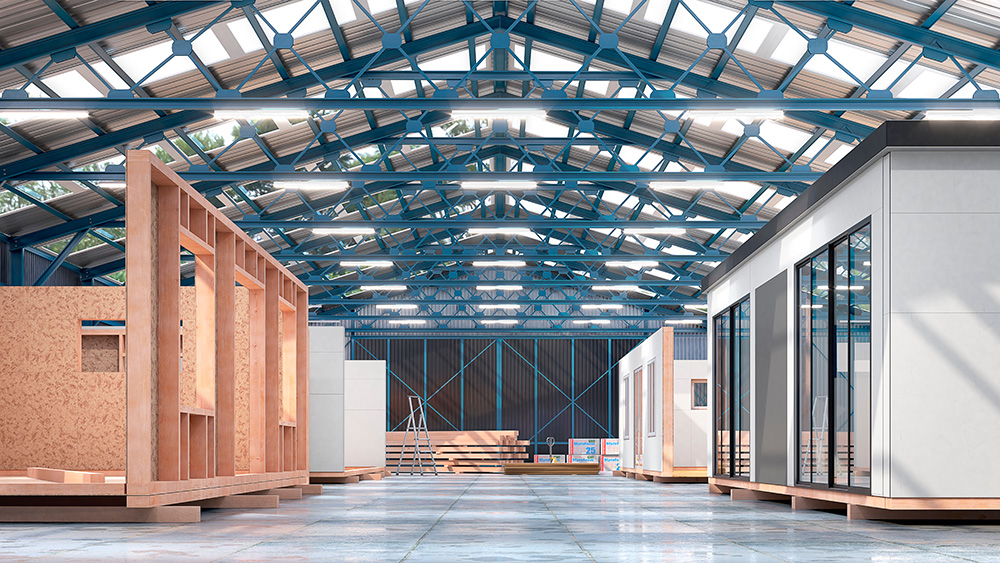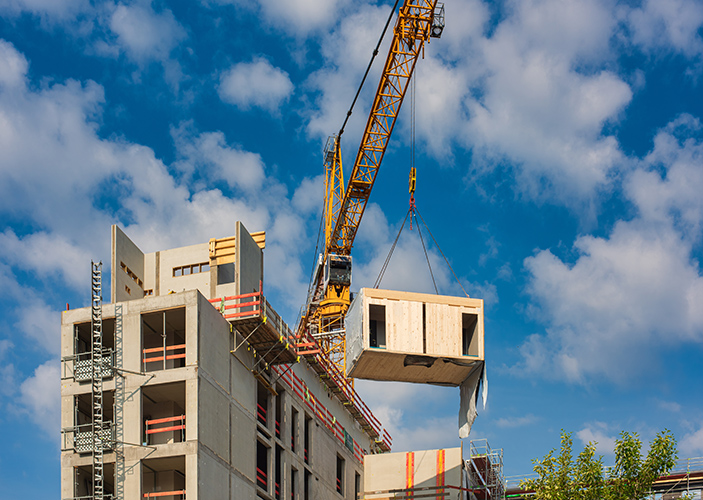Navigating the NSAI MMC Agrement certification process

Martin Searson, Head of Modern Methods of Construction, National Standards Authority of Ireland, discusses the process of applying for Agrement certification for MMC building systems.
While some reading this article will be familiar with the process of applying for Agrement certification, those who may be preparing to submit modern methods of construction (MMC) or offsite specialist building systems, there are a number of crucial points to be considered before trying to navigate the process. The growth of offsite and other MMC processes in recent years in this country has resulted in the need to establish a new division within the National Standards Authority of Ireland (NSAI) to process the rapidly growing number of building systems being submitted for scrutiny.
Martin Searson, the NSAI’s Head of MMC, is a leading authority in the Irish offsite field. In 2020, as Chair of the MMC Group under the direction of the Construction Sector Group’s (CSG’s) Innovation and Digital Adoption Subgroup, he prepared the ‘CIF Report on Modern Methods of Construction’. One thing that becomes abundantly clear after even a cursory readthrough of the report is that the adoption of MMC has the potential to transform the entire industry rendering it almost unrecognisable as the industry it was even just a few years ago. Projects such as the OPW’s and John Sisk & Son’s Rapid Build Housing project to provide homes for Ukrainians fleeing war brought together a number of offsite manufacturers to collaborate and deliver around 700 new modular homes in just over a year.
As head of the NSAI’s MMC Unit, Martin Searson continues to play a part in ensuring that the MMC /modular building systems being delivered to sites across the country are of a standard that developers, contractors and homeowners need.
Before looking at the intricacies of the MMC /modular building system Agrément process, Martin Searson first outlines the purpose of the new NSAI MMC department.
“From an overall perspective, the NSAI is Ireland’s official standards body. It operates under the Department of Enterprise, Trade and Employment. It aims to inspire consumer confidence and create the infrastructure for products, systems and services to be recognised and relied on worldwide. Our certification processes are a core part of that work,” he explains.
The MMC certification scheme was launched in June of 2023. This certification scheme falls under Housing For All, focusing on enhancing holistic construction building system assessment processes for the residential sector to facilitate certification of MMC, the introduction of sustainable construction building systems and oversight of both off-site and on-site installations.”
He continues: “In order to comply with current Irish Building Regulations for new building systems or novel sustainable construction products, a company must have Agrément certification as set out in Technical Guidance Document (TGD) Part D – Materials and Workmanship (2013). NSAI Agrément helps set the bar for construction quality in Ireland, through this certification scheme.”
What is Agrement certification?
Agrement certification is designed specifically for new building materials, products, processes and building systems that do not yet have a long history of use and for which published national standards do not yet exist. NSAI Agrément assesses, specifies testing, and, where appropriate, issues Agrément certificates for such products or building systems.
Searson notes: “The purpose of Agrément is to raise standards in the building industry, particularly in respect of innovative building systems and modular construction. The criteria upon which Agrément certification is based vary from product to product or modular solution, taking into account construction standards across a range of measures such as safety, habitability, durability, maintenance, practicability, and the legal framework. The Agrément certificates we publish are also in accordance with the Irish Building Regulations and the rules of the European Union of Agrément Institutes for Construction (UEAtc).
He continues: “NSAI has also published the Agrément Guide for Modern Methods of Construction under the Housing for All plan. The purpose of the guide is to provide more information on the Agrément certification assessment process for MMC, such as offsite construction, 3D volumetric modular construction, 2D panelised systems and structural insulated panels, for example. The aim is to enhance the certification process for MMC and provide a clear pathway for system manufacturers on the assessment process for Agrément certification.”
He adds that in a broader sense, the Agrément process follows seven key steps. These are:
- MMC Enquiry
- Initial Application
- Application Assessment and Contract scoping
- Technical Assessment Specification (TAS) Development
- Factory Production Control (FPC) audits / Surveillance auditing
- Internal Technical Review
- Certificate Issued and Published on the NSAI Website subject to successful assessment.

Initial Agrement certification application phase
He further explains: “At the initial application phase, the MMC unit asks applicants to provide a detailed description of the proposed usage of the product, modular building system, product range, full details of ancillary items used to assemble the product/system or during its installation and any relevant documents, such as technical details of CE marking certificates held to help it to provide a clear picture from the outset to a client as to what assessment steps may need to be taken throughout the process. Through this, we hope to be realistic, open, and honest with clients around the timelines for the process and the necessary testing and assessment that will be required to achieve certification.”
The Agrement certification assessment process
Based on an initial meeting and the completed ‘Building system checklist form’, a Technical Assessment Specification (TAS) will be developed by NSAI and shared with the manufacturer.
Martin Searson explains the purpose of this. “The TAS will set out technical criteria for the assessment and testing of the system. The system will be assessed in accordance with the Irish Building Regulations and any relevant standards and codes of practice currently available. It is important that manufacturers applying for Agrément certification for MMC familiarise themselves with the TAS process as it provides essential guidance on technical assessment for Agrement certification, as set out in the NSAI MMC Guidance document.”
Assessment processes that a manufacturer can expect to apply
As Searson mentioned, the assessment process can vary from product to product or modular building system, but assessments may include any of the following or a combination of:
- Irish Building Regulations and European standards compliance verification
- Laboratory tests results checks
- On-site evaluations of as-constructed product/system
- Factory Production Control (FPC) inspection
- Quality management system verification
- Installation and Assembly procedures
- On-site inspection plan
- Post-construction maintenance programme, etc.
Reviewing Agrément certification
Subject to the results of the assessment, NSAI will draft the Agrément certificate for final review and share it with the manufacturer.
Martin Searson notes: “All images shown in the certificate shall be provided by the manufacturer. 2D images are acceptable provided they present information better than 3D images, which are generally preferable to include in the certificate.”
Once the Agrément certificate is signed off by the manufacturer and approved by NSAI, the authority publishes the certificate on its website. All NSAI Agrément certificates can be found on the NSAI website.
Surveillance audit programme
In order to maintain certification and ensure continued adherence of the system to that certified, NSAI has implemented a surveillance audit programme.
He explains: “Last year, all NSAI building system-certified MMC clients were subject to an ongoing surveillance audit of their operational/production processes. In addition, Agrément certificates have a validity of five years from the date of issue or the date of the latest revision. Before the certificate expires, it will be reviewed to ensure the product/system meets all current regulations

Benefits of Agrément certification for manufacturers
Martin Searson explains that Housing for All and TGD Part D necessitates manufacturers to have Agrément certification for modular construction solutions. However, the benefits of MMC extend beyond just the residential housing sector.
“In 2021 alone, the Irish government spent over €10bn on construction projects prescribed by the National Development Plan (NDP) and Project Ireland 2040. Project Ireland 2040 is the national framework in place for the development of physical infrastructure in Ireland for the coming two decades. Under Project Ireland 2040, MMC will increase modular and offsite manufacturing to higher standards of design, fabrication, testing and certification. Agrément certification is central to this as well.”
He adds: “In March of this year, the government agreed on a national strategy for asylum seeker accommodation, which has modular housing as a key pillar of the delivery of state-owned accommodation. There is no question that MMC is becoming more and more prevalent in public sector housing provision, and the usage of more sustainable business practices that are enabled by MMC is becoming increasingly common across the construction sector. Furthermore, the government have utilised modular schools to meet demographic increases across the state, with MMC supporting this capital programme.”
Related NSAI MMC certification processes
NSAI also offers certification to ISO 19650, the international standard for managing information over the whole life cycle of a built asset using building information modelling (BIM). While the use of BIM is still growing in the Irish construction sector, its inclusion in public sector tenders under the new BIM mandate and with increased training and upskilling by industry professionals will soon see it become more widely used across the country.
Martin Searson comments: “As the construction industry adopts modern methods such as integrated project delivery (IPD) and BIM, it is expected that new and innovative materials and building processes will see the construction industry here evolve more rapidly than it has in decades.
“Collaboration and IPD are used in construction to increase communication and team efficiencies by providing an integrated approach for personnel, systems and practices, while BIM is the process of managing the information produced during design and throughout a construction project.
“The synergies found in these integrated project management and construction models will help drive innovation and efficiencies in construction here in Ireland.”
Global outlook
Martin Searson points out that the adoption of MMC has been steadily increasing across the globe over the past few decades, driven by various factors such as technological advancements, sustainability concerns, labour shortages, and the need for faster and more cost-effective construction processes.
“MMC encompasses a range of innovative techniques and technologies aimed at improving efficiency, quality, and sustainability in the construction industry. A great example here is the significant trend in the shift towards offsite construction methods. Offsite construction involves the prefabrication of building components in a controlled factory environment before they are transported to the construction site for assembly. This approach offers numerous advantages, including reduced construction time, lower labour costs, improved quality control, and minimised waste generation. As a result, offsite construction or Design for Manufacture & Assembly (DfMA) has gained popularity in countries across Europe, North America, Asia, and beyond.”
Opportunities for the Irish MMC sector
He explains that the global trend in MMC holds significant implications for Ireland’s economic growth and development.
“As MMC gains traction worldwide, Ireland stands to benefit from aligning with this trend, leveraging innovative construction techniques to bolster its economy. “Firstly, embracing MMC enhances Ireland’s competitiveness in the global construction market. By adopting advanced technologies and practices, Irish construction firms can position themselves as leaders in efficiency, quality, and sustainability, attracting international investment and fostering partnerships with global players through the Agrément certification scheme.
“Furthermore, the adoption of MMC stimulates job creation and skills development within Ireland. While MMC reduces the demand for certain traditional construction roles, it simultaneously creates opportunities in areas such as digital design, robotics, and offsite manufacturing. This shift towards a more technologically advanced construction sector cultivates a highly skilled workforce, driving innovation and productivity across the economy.”
He adds: “Moreover, MMC contributes to infrastructure development and urban regeneration, helping to support Ireland’s economic growth objectives. By enabling faster project delivery and cost efficiencies, MMC can facilitate the construction of essential infrastructure projects, such as transportation networks, utilities, and public facilities, laying the foundation for sustainable economic expansion.”
Martin Searson believes that embracing the global trend in MMC presents Ireland with a strategic opportunity to enhance its competitiveness, foster innovation, create employment, and accelerate economic growth while addressing pressing societal needs.
“By capitalising on MMC, Ireland and offsite manufacturers can position themselves as a dynamic hub for sustainable construction practices, driving prosperity and resilience in the years to come.”
Steps to Agrement certification
Advising on what manufacturers entering the Irish Agrément process should do, Martin Searson says the first piece of advice he would offer is that manufacturers should provide as much relevant material as possible at first instance to help support their certification journey.
“The more information the team has at those early stages, the more straightforward it will be for us to progress your application and move to the assessment stages of an application.
“Secondly, I would encourage any of your readers to be realistic about the level of scrutiny involved in the process. As mentioned, NSAI published the Guide to Agrément Certification under Housing for All. While it’s a detailed document, it gives a comprehensive picture of what’s involved in the full certification process. The intention is that it will support clients at an early stage in preparing for any elements of the assessment process that will necessitate lengthy preparatory work on their side. Our team aim to make the process as accessible and practical as possible, but it is a practical reality that the assessment process has to be thorough to meet the high standards required for Agrément certification,” he concludes.
Next steps
The NSAI website has a dedicated section for MMC, which highlights all the support documentation Martin Searson mentions above, including contact details for the NSAI MMC team. The team can take queries from manufacturers who want to hear more about the process and provide any support possible.
To learn more, visit www.nsai.ie/certification/agrementcertification




